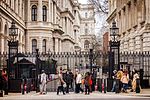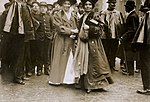Foreign, Commonwealth and Development Office

The Foreign, Commonwealth & Development Office (FCDO) is a department of the Government of the United Kingdom. It was created on 2 September 2020 through the merger of the Foreign & Commonwealth Office (FCO) and the Department for International Development (DFID). The FCO, itself created in 1968 by the merger of the Foreign Office (FO) and the Commonwealth Office, was responsible for protecting and promoting British interests worldwide. The head of the FCDO is the Secretary of State for Foreign, Commonwealth and Development Affairs, commonly abbreviated to "foreign secretary". This is regarded as one of the four most prestigious positions in the Cabinet – the Great Offices of State – alongside those of Prime Minister, Chancellor of the Exchequer and Home Secretary. The current foreign secretary is Liz Truss. The FCDO is managed day-to-day by a civil servant, the permanent under-secretary of state for foreign affairs, who also acts as the Head of Her Majesty's Diplomatic Service. The current permanent under-secretary is Sir Philip Barton, who took office on 2 September 2020. The expenditure, administration and policy of the FCDO are scrutinised by the Foreign Affairs Select Committee.
Excerpt from the Wikipedia article Foreign, Commonwealth and Development Office (License: CC BY-SA 3.0, Authors, Images).Foreign, Commonwealth and Development Office
King Charles Street, London Lambeth
Geographical coordinates (GPS) Address External links Nearby Places Show on map
Geographical coordinates (GPS)
| Latitude | Longitude |
|---|---|
| N 51.503055555556 ° | E -0.12777777777778 ° |
Address
Foreign, Commonwealth and Development Office (FCDO;Foreign Office)
King Charles Street 30
SW1A 2AH London, Lambeth
England, United Kingdom
Open on Google Maps










